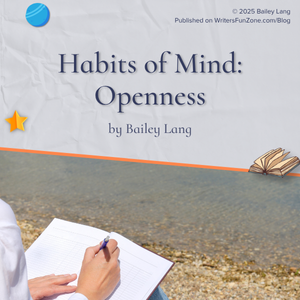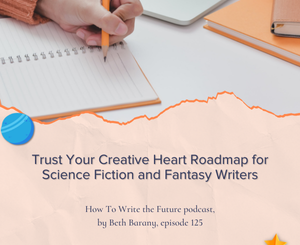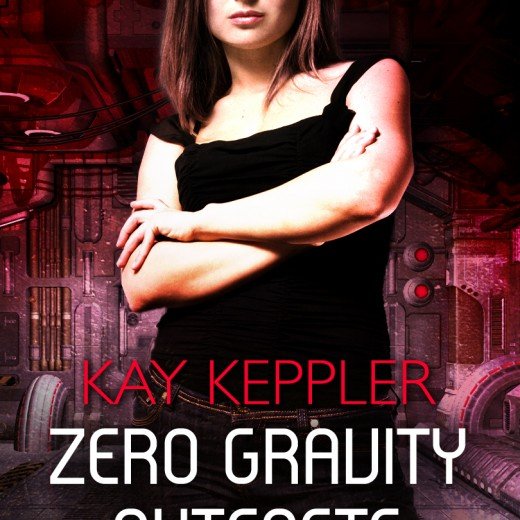Habits of Mind: Openness by Bailey Lang
 Let’s welcome back Bailey Lang as she shares with us “Habits of Mind: Openness.” Enjoy!
Let’s welcome back Bailey Lang as she shares with us “Habits of Mind: Openness.” Enjoy!
***
As writers, habits of mind — our thought patterns and orientation to learning — shape our external activities, like our writing practices.
In this series, we’re talking about eight crucial habits of mind for writers.
Curiosity, which we talked about last time, Habits of Mind: Curiosity by Bailey Lang · Writer’s Fun Zone is a drive to learn more about the world.
Today, we’re talking about openness.
What is Openness?
The framework for this series describes openness as “The willingness to consider new ways of being and thinking in the world.”
It’s easy to see why this habit of mind is important for writers, especially (though not exclusively!) novelists.
Unless you want every character you write to be a thinly veiled version of you (bo-ring — not that you’re not lovely, of course!), you need to be able to “consider new ways of being and thinking” and figure out how to represent them as authentically as possible on the page.
Openness will help you get inside your characters’ heads and make them feel like real, flawed, interesting people.
It’s a lot harder to write compelling villains if you’re not willing to consider why those villains think they’re doing the right thing, for example.
However, I want to be clear that openness doesn’t mean it’s okay to write caricatures as a way of representing difference, or that deeply considering other ways of being excuses stereotypes or cultural appropriation.
We’ll come back to these ideas in the article on responsibility.
Openness also keeps us from intellectual stagnation.
The online world, in particular, is algorithmically driven to corral us within ever-tightening spirals of stuff we probably already like (or stuff that makes us angry enough that we can’t walk away from our screens.)
The more time we spend in those loops, the more closed-off we become.
We become less open to new ideas, perspectives, and ways of being in the world.
We see our own interests reflected back to us again and again, as if they’re the whole of the human experience.
Cultivating openness as a habit of mind is a way to challenge the ways social media algorithms try to box us in while also becoming better, more interesting writers.
Openness and curiosity go hand in hand in this pursuit.
Curiosity encourages us to ask questions and seek information — openness encourages us to engage with the answers without rushing to judgment.
As a habit of mind, openness encourages writers to:
- Thoughtfully consider multiple perspectives (including our own)
- Embrace learning without defaulting to making snap judgments
- Experiment with different research and writing practices
How do Writers Cultivate Openness?
Embracing openness doesn’t mean you have to seek out someone whose political beliefs are the polar opposite of yours.
This is often the first thing many of us think of when we’re encouraged to practice a habit of mind like openness.
You can certainly try it, but it’s a bit like jumping into the deep end of the pool when you haven’t graduated from wearing inflatable arm floaties.
Don’t set yourself up for failure!
Developing openness as a habit of mind starts with noticing your own judgments, opinions, and preferences.
- What are your strongly held beliefs? Why do you hold them?
- What are your biggest pet peeves? Where did they come from?
- What are your cultural practices around events like marriage, death, and holidays?
- How might any of the above be different if you had been born in another country or a different century?
Pairing openness with curiosity gives you a double-whammy of helpful habits of mind.
When you notice yourself feeling judgmental or getting caught up in disagreement, see if you can pause, ask questions, and spend some time considering the answers you find.
Cultivating openness requires becoming more aware of what we’re open to, what shuts us down, and how we balance considering new perspectives with our own discernment.
Openness Activities for Writers
Practicing openness is about reorienting our thinking away from judgment and toward thoughtful interest.
Being open doesn’t require us to agree with everything we learn — but not leaping to agreement vs. disagreement is a good sign that you’re becoming more open!
Here are two activities that support writers in practicing openness:
Be a Time Traveler or Space Alien
Re-examining the practices, activities, and traditions we take for granted is a great way to cultivate openness.
This is a quick, fun exercise to help you get into a more open mindset.
Choose a specific memory you have of a tradition (blowing out candles on a cake, marking a holiday with gift-giving, or a unique family celebration).
Then, pretend you’re an alien visiting Earth for the first time or a time traveler from the distant past or future.
Spend five minutes writing about the memory as if you’re witnessing it for the first time from the alien or time traveler’s perspective.
- What do you notice?
- What seems important?
- What seems strange?
Get Outside Your Comfort Zone
Read a book, watch a documentary, or listen to a podcast about a culture, practice, or way of life that’s different from yours.
Find a novel in a genre or format you wouldn’t normally pick up.
Choose something you find interesting and different — and maybe a little challenging — and learn everything you can about it.
Focus on staying open to the experience and see what happens.
- Where do you start to feel closed-off? Why?
- What sparks your curiosity?
- How might you incorporate what you’re learning into your writing?
This is a great activity to pair with the library visit I recommended in the curiosity article!
Let us know in the comments how the openness experiments go!
Reading Recommendations
- Open: Living with an Expansive Mind in a Distracted World (Affiliate link)
- You’re Probably Not as Open-Minded as You Think. Here’s How to Practice.
- How to Keep an Open Mind: An Ancient Guide to Thinking Like a Skeptic (Affiliate link)
***
About the Author
 Dr. Bailey Lang is a book coach, writer, and editor. At The Writing Desk, she helps authors build sustainable, enjoyable writing practices that take their books from draft to done. Bailey has a PhD in rhetoric and writing studies and loves geeking out about writing.
Dr. Bailey Lang is a book coach, writer, and editor. At The Writing Desk, she helps authors build sustainable, enjoyable writing practices that take their books from draft to done. Bailey has a PhD in rhetoric and writing studies and loves geeking out about writing.
You can sign up for Bailey’s free newsletter, Word to the Wise, for more writing advice and regular author interviews.






